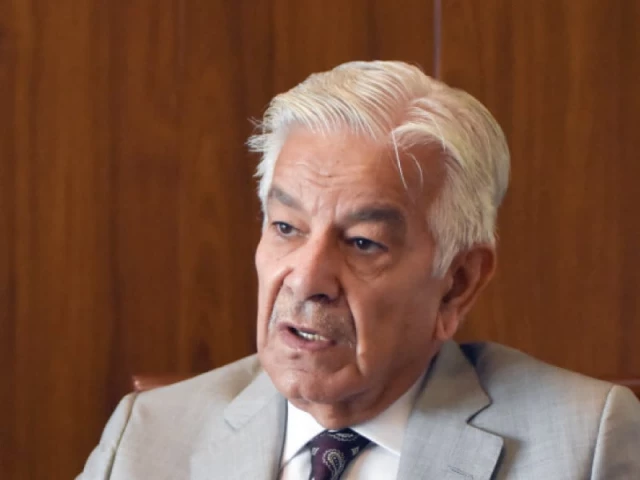Minister labels Kabul regime a proxy of India; Questioning the legitimacy of the Taliban government
ISLAMABAD:
Defense Minister Khawaja Asif issued Pakistan’s sternest warning yet to the Taliban regime on Wednesday, declaring Islamabad would not hesitate to strike “deep into Afghanistan” if Kabul failed to rein in militants using its soil for cross-border attacks.
The warning, the sharpest yet since the collapse of peace talks in Istanbul, marks a decisive hardening of Islamabad’s stance after weeks of what officials described as stretched patience. The latest effort, brokered by Turkiye and Qatar, faltered under Afghan evasions and stubborn refusal to guarantee that its soil would not be used for aggression, sources had previously revealed.
“We will conduct strikes, we definitely will,” Asif told reporters at Parliament House. “If their territory is being used and they are violating our territory, then if we have to go deep into Afghanistan to retaliate, we will certainly do that.”
Asif said that while Pakistan approached the talks with sincerity, the Afghan side seemed bent on obstruction. “Kabul was not sincere at any level for any arrangement. According to India’s directives and by becoming its proxy, Fitna al-Hindustan wants to exploit its position over Pakistan through Afghanistan,” he said.
“The entire leadership of Kabul plays into India’s hands.”
According to Asif, working groups from both sides had almost reached consensus several times before Afghan delegates abruptly withdrew following instructions from Kabul. “Again and again, every time something was finalized and an agreement was worked out – this happened three or four times, I think – they contacted Kabul and there was a ‘no’ from Kabul, because of which we could not reach an agreement with them,” he said.
He warned that if the Afghan leadership had “chosen the path of confrontation, so be it”.
Asif said the Taliban negotiators had verbally admitted that the outlawed Tehreek-e-Taliban Pakistan (TTP) was operating from Afghan soil, but refused to put that commitment in writing. “They agreed to everything but were not ready to give in writing,” he said.
Asked if TTP representatives were discussed for inclusion in future talks, Asif replied: “Even if they had said so, it would have been a total rejection from us.”
He added that even the mediators – Qatar and Turkiye – had now recognized “futoor (weakness)” in Kabul’s intentions.
“We made this attempt with full sincerity so that Pakistan and Afghanistan can live in peace as good neighbours. But if they have handed over their reins to Delhi, then this will be difficult,” he said. Asked if he still saw room for reason, he said: “It can only be prayed, [but] there is no medicine”.
Asif also questioned the legitimacy of the Taliban government itself, saying it lacked international recognition and control over its own territory.
“This government does not have its mandate in the whole of Afghanistan. Afghanistan is practically broken into pieces, where one or the other influential terrorist group… there is an assembly of international terrorism there,” he said.
He added that Afghanistan neither “meets the definition of a state” nor functions as one. “They are the ones involved in the killings and they take financial advantage of being the rulers.”
When asked if the situation was heading for another Tora Bora-style confrontation, he replied: “It’s definitely a possibility”.
Earlier in the day, Asif had issued a fiery warning to Kabul on social media, warning that the Taliban rulers would “test Islamabad’s resolve at their own peril and doom”.
“We have borne your treachery and scorn for too long, but no more. Any terrorist attack or any suicide bombing inside Pakistan will leave you with the bitter taste of such mishaps. Be calm and test our resolve and capabilities if you wish, at your own peril and doom,” he wrote on X.
The minister said Pakistan entered talks “to give peace a chance” at the request of “brotherly countries”, but “poisonous statements by certain Afghan officials clearly reflect the insidious and splintered mindset of [the] Taliban regime”.
“Let me assure them that Pakistan does not need to use even a fraction of its full arsenal to completely annihilate the Taliban regime and push them back to the caves to hide. If they so desire, the repetition of the scenes of their route at Tora Bora, with their tails between their legs, would certainly be a sight to behold for the people of the region,” he wrote.
Accusing the Taliban of “blindly pushing Afghanistan into yet another conflict,” Asif said they were trying to preserve their “usurped rule and war economy.”
“Despite knowing full well their inherent limitations and the hollowness of their war cry, they beat the drums of war to maintain their crumbling façade. If the Afghan Taliban regime is maddened to destroy Afghanistan and its innocent people again, so be it,” he added.
Referring to the oft-quoted phrase “graveyard of empires,” Asif said, “Pakistan certainly does not claim to be an empire, but Afghanistan is certainly a graveyard, certainly of its own people. Never a graveyard of empires, but certainly a playground of empires, you have been throughout history”.
He warned the “warmongers among the Taliban regime” that Pakistan’s restraint should not be mistaken for weakness. “If the Taliban regime wants to fight us, the world will Insha Allah (God willing) see that their threats are just performative circus!” he claimed.
United Nations
Meanwhile, the United Nations expressed concern over the breakdown of talks between Pakistan and Afghanistan and urged both sides to avoid renewed conflict.
“Yes, of course it is. We very much hope that even though the talks are on pause, the fighting will not be renewed,” UN spokesman Stephane Dujarric said during a regular briefing at UN headquarters in New York, according to APP.



